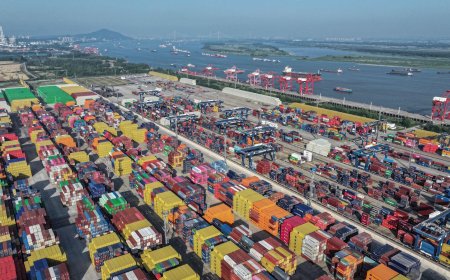Wall Street Week Ahead: Investors Eye Tariff Deadline as US Stocks Rally
US stock markets rally on strong fundamentals, but investors remain cautious as a crucial tariff deadline approaches. What lies ahead for Wall Street?

Market Optimism Clashes with Geopolitical Uncertainty
Wall Street is approaching the upcoming trading week with cautious optimism as investors ride the momentum of a broad-based equity rally. However, attention is sharply focused on a critical upcoming deadline regarding potential tariff implementations — a flashpoint that could reverse recent gains and recalibrate risk assessments.
The S&P 500, Dow Jones Industrial Average, and Nasdaq Composite all posted solid gains this past week, driven by resilient U.S. economic data, softer inflation figures, and a clearer Federal Reserve stance on rate trajectory. Yet, with the White House set to clarify its position on potential trade tariffs — particularly against Chinese electric vehicles, solar panels, and strategic tech — investors are entering a phase of heightened vigilance.
A Rebound Fueled by Fundamentals
The benchmark S&P 500 has surged over 16% year-to-date, buoyed by robust corporate earnings, cooling consumer price indices (CPI), and growing conviction that the Federal Reserve may begin rate cuts as early as September. Friday’s non-farm payroll report, while slightly softer than expected, reaffirmed the “Goldilocks” narrative of a labor market that is neither too hot to spur inflation nor too weak to trigger recession fears.
“The macroeconomic backdrop is currently favorable for equities,” said Victoria Greene, CIO at G Squared Private Wealth. “But geopolitical risk — particularly around tariffs — is the wild card. Markets are hoping for clarity, if not outright de-escalation.”
Tariff Decision Looms Large
The Biden administration has until mid-July to finalize its long-awaited tariff strategy targeting specific Chinese imports. These levies are being reviewed under Section 301 of the Trade Act, originally implemented during the Trump era to counter alleged intellectual property theft and unfair trade practices.
While President Biden has hinted at a “targeted” approach aimed at strategic sectors like semiconductors and clean energy, investors fear unintended consequences. Tariffs could stoke inflation, impact supply chains, and prompt retaliatory actions from Beijing — just as global economies show signs of synchronized recovery.
“This isn’t just a bilateral issue; it's a global macro event,” noted Michael Arone, Chief Investment Strategist at State Street Global Advisors. “The complexity lies in balancing economic competitiveness with inflation control and diplomatic stability.”
Sector-Specific Impacts
The sectors most sensitive to the tariff outcome — including technology, industrials, and consumer discretionary — are experiencing increased volatility. Electric vehicle makers, both domestic and international, have been particularly reactive to speculation about potential import duties.
Meanwhile, the semiconductor sector — which has been central to the 2024 bull run, thanks to AI-driven demand — could see regulatory overhang if tariffs disrupt component imports or licensing agreements. Conversely, domestic solar panel manufacturers and certain steel producers may benefit from protectionist measures.
“You could see a short-term sector rotation if tariffs go into effect,” explained Liz Ann Sonders, Chief Investment Strategist at Charles Schwab. “Industrials might catch a bid on reshoring trends, while multinationals with China exposure may underperform.”
International Markets on Alert
Global equities, especially in Asia-Pacific, are closely watching Washington’s next move. A hawkish tariff policy could dampen investor sentiment across emerging markets and affect cross-border capital flows. Notably, China’s CSI 300 and Hong Kong’s Hang Seng Index have shown increased sensitivity to U.S. trade rhetoric in recent sessions.
“A significant tariff announcement will likely trigger reciprocal actions,” warned Calvin Tse, head of macro strategy at BNP Paribas. “This could affect not only equities but also FX and bond markets, creating a broad-based ripple effect.”
Investor Strategy: Hope for the Best, Hedge for the Worst
Despite near-term uncertainties, the broader market sentiment remains constructive, underpinned by economic resilience and a possible Fed pivot. However, institutional investors are increasingly exploring protective strategies to mitigate downside risks.
Options activity has surged in recent sessions, with a notable uptick in protective puts and volatility hedges tied to tariff-sensitive sectors. Portfolio managers are also increasing allocations to gold and U.S. Treasuries, traditional safe havens in times of trade disruption.
“We’re not de-risking entirely, but we’re layering in protection,” said Shannon Saccocia, CIO at NB Private Wealth. “Flexibility is key — this market rewards agility, not complacency.”
Outlook: A Week of Binary Risk
Heading into the second week of July, Wall Street is positioned for a potential inflection point. If the administration opts for a moderate, sector-specific tariff framework, equities may continue their upward trajectory. However, an aggressive or broad-based approach could reignite inflation fears and prompt a Fed rethink — disrupting both markets and sentiment.
As always, the market’s reaction will hinge less on the headline itself and more on the tone, execution, and perceived geopolitical intent behind it.
What's Your Reaction?
 Like
0
Like
0
 Dislike
0
Dislike
0
 Love
0
Love
0
 Funny
0
Funny
0
 Angry
0
Angry
0
 Sad
0
Sad
0
 Wow
0
Wow
0













































































